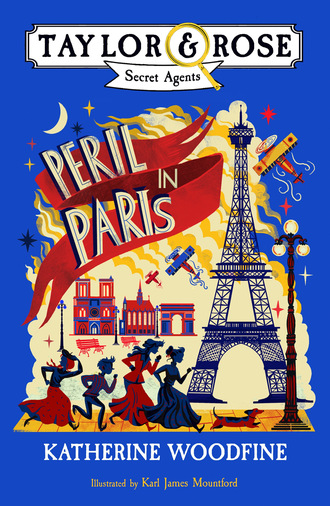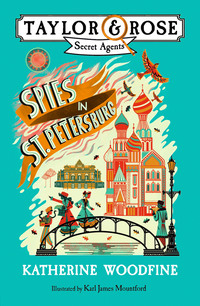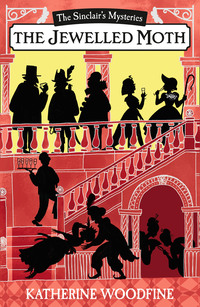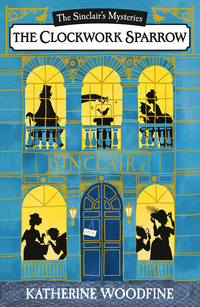
Полная версия
Peril in Paris
She watched him closely as he made his way between the people: porters sweating under the weight of heavy luggage; ladies in shady hats, up to London for a day’s shopping; a huddle of tourists, poring over a Bradshaw’s Railway Guide. Not one of them noticed the grey man, but the girl’s eyes followed him keenly.
As the grey man drew near the Left Luggage Office, she went briskly in the same direction. Seeing a young lady approach, he doffed his hat with a courteous but unremarkable bow, and held the door open for her, keeping his head down. Her frilly skirt swished forward as she tip-tapped ahead of him into the office.
The Left Luggage Office was busy and the grey man slid invisibly through the hustle and bustle to join the queue behind a smart gentleman in a bowler hat. Rummaging in her handbag as if she were looking for her ticket, the girl stepped quickly into the queue behind him. He was staring down at the newspaper in his hand, as if quite absorbed in an article of the kind that would have interested Dr Muller – a write up of a new exhibit at the British Museum.
When it was his turn to approach the counter, the ruddy-faced fellow on duty barely glanced at him as he handed over the ticket. ‘Right you are, sir! Just a moment!’ he said cheerfully, disappearing to the shelves where the parcels were stored.
The grey man waited. His shoulders had stiffened slightly and for the first time, the girl thought she could detect signs of unease. He leaned forward, turning his grey hat over in his hands. She tried to imagine what he was thinking. Was he wondering why the fellow was taking so long? Was he wondering if his contact could be trusted – whether he had delivered the parcel as promised, or whether he’d simply taken the money and run? Was he thinking of Ziegler, watching and waiting in faraway Berlin? But then – there it was! The fellow was returning, and in his hands was a small rectangular parcel, wrapped in brown paper and tied with string.
‘Here you are, sir.’
The girl’s breath quickened as the parcel was placed into the grey man’s hands. It looked heavy: there must be at least four of the books inside. She could not allow them to fall into Ziegler’s possession.
The grey man’s face did not reveal even a shadow of excitement. He remained bland and ordinary as he said a polite ‘thank you’, wished the fellow ‘good day’ and turned to go, the parcel tucked under his arm.
The girl stepped swiftly after him. She must not lose him now; she had to get her hands on that parcel. But even as she did so, the fellow on duty called out: ‘Excuse me, sir, stop there!’
The grey man froze.
‘Now then, sir. Don’t you rush off in such a hurry. You’ve forgotten your hat!’ said the fellow cheerfully, as he held the grey man’s hat out towards him.
The grey man beamed back at him. ‘So very kind,’ he flustered.
How foolish, how unexpectedly amateur of him to have forgotten his hat like that, the girl marvelled! Yet as he set down the parcel for a moment to reach into his pocket for two-pence to press into the fellow’s hand, it came to her that perhaps it was not so very stupid after all. He was playing the part of scholarly Dr Muller to perfection, she realised. Leaving his hat behind was exactly the sort of thing that a man like Dr Muller would do. He would be forgetful and absent-minded, distracted by the research he was doing in London’s museums. He was quite beyond suspicion – the kind of man who could not even remember his own hat.
All the same, he had played right into her hands. As the grey man bowed and smiled, she stepped forward, swept up the package from where he had set it down, and was gone in an instant, before he or anyone else had realised she was there.
The office door swung open before her. Behind, she heard a voice cry: ‘My . . . my parcel!’
‘Your parcel, sir?’
‘It’s gone!’
She did not stay to hear any more. The station concourse was large and she knew the grey man would soon be on her trail. She made her way through the crowds walking briskly, but not so fast as to draw attention to herself. She weaved between a porter with a pile of trunks and a man with a luncheon basket, making for the station exit. Behind her, she knew that the grey man was following. As she stepped outside, she dared to glance back over her shoulder: yes, there he was, speeding through the crowds. He was gaining on her, and she knew exactly what he would be thinking. She’d heard it plenty of times before. A young girl – all alone! He’d be certain that she’d be easy to overpower, or outwit.
‘Hey, mister, watch where you’re going!’ she heard the newspaper-seller call out indignantly as the grey man sprinted out of the railway station and down the steps behind her, shoving his way past the barrow of newspapers. He was no longer concerned about being quiet or anonymous, the shuffling Dr Muller quite forgotten now. Ziegler must want this parcel very badly indeed. She tried to hold her nerve, to keep walking, lengthening her stride, going a little faster now, but not too fast. She wanted him uncertain. She mustn’t give anything away.
She moved steadily onwards, towards the row of station cabs. Behind her, the grey man dodged a delivery boy on a bicycle with an angry yell. She had stopped beside a cab; she had nodded to the driver; the door was open; she was stepping up inside –
The grey man leaped forward and just as she was about to clamber into the cab, he grabbed her by the arm and wrenched her back. His fingers bit into her skin.
She stared up at him, widening her eyes. She knew exactly what he was seeing: a young lady, daintily dressed, with white gloves and a parasol and a straw hat decorated with forget-me-nots. She let out a little gasp of alarm. ‘Sir, I beg you, let go of me at once!’ she cried out in a faint voice.
The cab driver had seen what was happening. ‘Here, what d’you think you’re playing at?’ he demanded angrily. ‘D’you know this fellow, miss? Leave go of her at once or I’ll yell for the constable.’
But the grey man ignored him completely. ‘The package . . . give me the package,’ he hissed.
‘The . . . the package?’ she gaped back at him.
‘Give it to me now! Or it will be the worse for you!’
‘But . . . but I don’t have a package,’ she said with a confused gasp, making her eyes wide and fearful. ‘I only have this.’
She thrust forward the object she was holding and the grey man gawped at it for a moment. It was not a brown-paper parcel at all, but a large blue-and-gold hat-box, marked with the name of London’s most fashionable department store. Startled, he let go of her, and she took the opportunity to scramble up into the cab, taking the hat-box with her.
‘You want to watch yourself, mate,’ the cab driver was admonishing him. ‘You can’t go round accosting young ladies like that!’
But the grey man wasn’t listening. She could see that he was furious with himself for chasing after a perfectly ordinary girl – a young English miss, collecting something as innocent as a new hat – whilst somehow the enemy had tricked him, swiping his precious parcel from under his nose. His face darkened with anger. He had lost the parcel he had worked so hard to obtain. He had failed Ziegler. He cursed aloud.
‘That’s enough of that kind of language,’ the cab driver told him. He looked down at the girl: ‘Don’t you worry, miss. You’re safe now. Just you sit tight and I’ll see you home.’
He shook his head one last time as he drove away at a smart pace, leaving the grey man standing empty-handed, glaring furiously after them.
CHAPTER THREE
London
Inside the cab, the girl settled herself back comfortably against the seat.
‘So . . . where to?’ asked the driver, a young, good-looking fellow, with curly hair showing from beneath his cap.
‘The Inns of Court,’ she said, pulling the hat-box on to her knee and taking off the lid. ‘I expect the Bureau will want to see this straight away.’
‘All right, but let’s go the long way round,’ said the driver, reflectively. ‘You never know. That fellow might have some pals around who could still be watching us.’
‘Good scheme,’ agreed his passenger. Beneath some filmy tissue paper, she had unearthed from the hat-box a small, rectangular parcel, wrapped in brown paper. She weighed it in her hands.
‘What d’you reckon it is?’ asked the driver.
‘Probably Navy weapons manuals or signal books. Something highly confidential, at any rate.’
‘Something our old friend Ziegler would very much want to get his sticky hands on?’
‘Absolutely. That fellow was one of his agents. He’d paid someone in the Navy to steal these for him.’
‘And I s’pose he had to give him a tidy sum to get him to do that? No wonder he looked like he’d lost a shilling and found a sixpence.’ The driver grinned. ‘Unlucky for him – and old Ziegler too – that we just happened to be passing through the station, Soph.’
‘Oh, jolly unlucky,’ she agreed, smiling cheerfully back.
Sophie Taylor knew she had plenty to be cheerful about. Their assignment had gone like clockwork; the stolen package was safe; and it was very pleasant to be driving through town with Joe on a beautiful summer morning. The London Season was in full swing and, although it was still early, the day already had an air of gaiety about it. The long period of court mourning after the sad death of King Edward VII the previous year had come to an end, and now the city had cast off its sombre greys and mauves, and burst into summer colour, just like the new Queen Mary, who had been seen strolling in Richmond Park wearing a yellow hat with blue feathers. Clerks were strolling to work in their shirt-sleeves; flower-sellers were offering baskets of summer blooms on the street corners; and even London’s hansom cabs had been arrayed in brightly coloured tassels. As they drove through the park, she saw that people were reclining in the green-and-white sixpenny deckchairs, and that children had taken off their shoes and stockings to paddle in the lake.
Out on to the busy streets beyond, already thronged with buses and bicycles, the air was hot and shimmering, thick with the smell of horses and hay and motor-car fumes. Some people might have found it too hot, or too loud, or too crowded, but this was Sophie’s London, and she loved every buzzing, electric inch of it.
Now, she gazed out of the window as they rumbled along Piccadilly, past the Royal Academy, past the Ritz Hotel, and past the magnificent Sinclair’s department store, where doors were opening to the morning’s shoppers, and the uniformed doorman recognised them and tipped his hat.
Sophie knew that inside, on the first floor of the great building, the Taylor & Rose team – her team – would already be hard at work. Since their detective agency had first opened its doors two years ago, they had gained an excellent reputation, and were rarely short of clients. Now that they had expanded their offices and taken on more staff, Sophie could leave the others to deal with the day-to-day cases, whilst she concentrated her efforts on their most unusual client.
She had been working for this particular client for six months now, and she felt that she was getting rather good at intercepting telegrams, retrieving parcels and monitoring suspicious characters on their behalf. Working on assignments like this one, she felt a little thrill knowing that the people around her on London’s crowded streets couldn’t possibly have guessed that she was not an ordinary girl, but a government agent, doing vital work for the Secret Service Bureau.
Of course, most people didn’t know that the Secret Service Bureau existed. It had been set up by senior government officials to conduct highly confidential intelligence work. It was terribly mysterious: even Sophie herself wasn’t quite sure what all of the Bureau’s official work involved. What she did know was that a lot of it was concerned with what she had learned to call espionage – in other words, spies.
Although everyone seemed to be talking about the growing threat from Germany, and the Kaiser’s new warships, what the ordinary people around her on the streets of London didn’t know was that a network of enemy agents had already been established in Britain. The brilliant German spymaster, Ziegler, had been recruiting spies whose job it was to collect secret information to pass back to the German government. It was part of the Bureau’s job to stop them and, as one of their agents, that made it Sophie’s job too.
She grinned to herself. Three or four years ago, even the idea of working for a living would have been impossible to imagine, never mind doing a job like this. She’d certainly come a long way from her old life of piano lessons and pretty frocks. Now she was a detective, a businesswoman, and a government secret agent. She was a girl who knew how to crack a safe and pick a lock and throw a punch; a girl who had been taught to shoot a pistol by legendary New York detective Ada Pickering. She had found a missing diamond, had recovered two priceless paintings by the famous artist Benedetto Casselli, and had even helped to foil a plot to assassinate the King. She had outwitted the notorious villain who called himself ‘the Baron’ and, in doing so, had saved London from disaster. Not too shabby for someone who had only just turned seventeen.
It was strange now, to look back on the person she had been when Papa had died and she’d first been alone in London. Then the city had seemed like such a vast and lonely and frightening place. Now it felt familiar and friendly, full of places and people she knew. Most of all, of course, there were her friends – Joe and Billy, and all the other members of the Loyal Order of Lions, the organisation to which her parents had once belonged. The Order were sworn to work against the Baron’s sinister secret society, the Fraternitas Draconum, who had been responsible for the murder of both Sophie’s parents. Even though they were gone, keeping the society alive made her feel closer to them. Not that the society had needed to do very much lately – after all, they’d heard nothing of the Fraternitas since the Baron’s death, over a year ago. But just the same, Sophie was glad it was there. Being part of the Order felt almost like being part of a family. She was very grateful to have a circle of friends she knew she could count on, no matter what.
But as she hopped down from the cab outside the Inns of Court, she acknowledged to herself that even with the support of her friends, life wasn’t always entirely straightforward. Despite the success of Taylor & Rose, there were still plenty of people who did not care for the idea of young ladies being detectives. And running the agency was jolly hard work, especially without her best friend and business partner at her side.
Nothing seemed quite right without Lil. Certainly nothing was anywhere near as much fun.
Almost as though he had read her thoughts, Joe leaned out of the cab window and asked: ‘Reckon you can find out how she’s getting on?’
Sophie smiled up at him. She knew that he missed Lil too. ‘I’ll ask,’ she promised. ‘I might be a while – shall I meet you back at the office later?’ He nodded and she gave him a quick wave goodbye, before she turned and went under the archway and inside.
In the cool, echoing hallway, the sleepy concierge was sitting exactly as usual behind his desk. ‘Mr Clarke, is it, miss?’ he asked.
‘Yes please.’
‘Second floor and to the right,’ he instructed, exactly as if he hadn’t seen her here at least once a week for the last six months.
Following his instructions, Sophie made her way up the stairs. At the top was a door marked with a small printed card that read simply: CLARKE & SONS SHIPPING AGENTS. She knocked, and when a voice inside called out: ‘Come in!’ she stepped inside the headquarters of the Secret Service Bureau.
CHAPTER FOUR
Secret Service Bureau HQ, London
‘Oh, it’s you,’ said a sardonic voice.
Captain Carruthers was lounging in his chair, his shirt collar slightly open, his feet resting on the desk beside the typewriter, as he flipped through a stack of reports. ‘What do you want?’
‘I’m here to see the Chief,’ Sophie said shortly. She usually thought of herself as rather a polite person, but Captain Carruthers was always so rude that it was difficult to be anything but rude back.
‘Oh, well then, go through – you know where he is,’ said Carruthers, waving her away without bothering to look up from his papers.
Swallowing down her annoyance, Sophie crossed the room to the door that led to C’s office.
‘C’ was a code-name, of course. She didn’t know what it stood for – perhaps C for Chief, as they often called him, or C for Commander, or even C for Clarke the Shipping Agent, though that seemed unlikely. Lil sometimes joked: ‘I say, I wonder what happened to A and B?’ but Sophie had noticed she never said it to his face. Even Lil was rather in awe of C.
Now, as Sophie always did when she stepped into C’s office, she found herself looking around, thinking of all the secret business that must take place here. Not that there was anything especially mysterious or clandestine about the room itself – in many ways, it looked exactly like the ordinary shipping agent’s office it pretended to be. There was a big desk, stacked all over with piles of papers; a map of the world, dotted with pins; and a big bookcase crammed with fat leather-bound books. At the centre of it all was C himself, busily writing letters in his characteristic green-ink scrawl. To all intents and purposes, he too could have been a perfectly ordinary shipping agent. He looked like any affable older gentleman, with a gold watch chain and the traces of what Sophie suspected was his breakfast boiled egg on his shirt front.
The only thing that was unusual about C’s office was that there was a very large wind-up gramophone playing on a table in the corner, and C was humming along to the melody as he worked. Sophie knew very little about C, besides the fact that he ate soft-boiled eggs for breakfast, but she did know he had a passion for music. She had grown accustomed to having a musical accompaniment to their meetings. Today, she noted, it was Mozart’s Magic Flute Overture that could be heard drifting from the gramophone.
‘Ah, Miss Taylor! Delightful to see you. Well, well, and what have we here?’ C rubbed his palms together in anticipation, as Sophie placed the box on the desk in front of him. ‘Oh, splendid!’ he said to himself as he lifted the lid, pulling away the brown paper with the air of a child with a birthday present. ‘Aha! Code books . . . Signalling manual . . . Ah, yes, this one does look rather important . . . Carruthers!’ he called out in a louder voice.
After a moment’s pause, his assistant slouched in. He looked as surly as always, although C didn’t seem to notice. ‘Take these and check through them for me, there’s a good fellow, and telephone through to Admiral Stevens and let him know we have them. I rather think he might be worried about what’s become of them. Excellent work, Miss Taylor!’
Carruthers accepted the parcel without saying anything, tossing Sophie a bad-tempered glance as he strode back out of the room.
‘Now, tell me, who was Ziegler’s agent this time? The fellow calling himself Dr Muller, was he one of our old friends?’
Sophie shook her head. ‘I’ve not come across him before.’ She described the thin grey man, whilst C scribbled a few notes on the back of an envelope. ‘He wasn’t at all happy to have lost the parcel,’ she finished up.
‘I’m sure he wasn’t,’ said C, with a chuckle. ‘Well, I daresay we’ll meet him again before long. Now, I have a new assignment for you. Not parcels this time, but something rather different, which I think you may find interesting.’
He pushed a folder across the desk towards her, printed with the name PROFESSOR BLAXLAND in large black letters. Flipping it open, she saw several densely typed sheets of paper: lying on top was a photograph of a handsome, well-dressed, middle-aged man. Scribbled beneath the photograph were the words SSB AGENT.
‘This man works for the Bureau?’ she asked, picking up the photograph to look at it more closely.
‘Yes, in a way. Not in the same capacity as you, Miss Taylor, but as what you might perhaps term a consultant. Professor Blaxland had a specific area of expertise that was very useful to us. He was a language specialist, teaching at the Sorbonne in Paris, with a particular interest in codes and ciphers.’
Sophie looked up from the picture. ‘Was ?’
‘I am sorry to say that two days ago, Professor Blaxland was murdered.’ The Chief ’s plump, good-natured face looked sombre as he went on: ‘He was shot in his apartment, in the fifth arrondissement of Paris. It appears to have been a burglary gone wrong – his apartment had been broken into and the intruders were going through his possessions, when he returned and surprised them. The thieves shot him and escaped. However . . .’ C fell silent for a moment, leaving a heavy pause hanging in the air before he continued: ‘My fear is that Blaxland may have been deliberately targeted, and the murder set up to appear like a burglary.’
‘But who would do that, and why?’ asked Sophie.
‘That is exactly what I want you to find out. I am sending you to Paris, Miss Taylor. You leave on tomorrow morning’s boat-train.’
Sophie stared at him, taken aback. Paris? Following suspects; intercepting parcels; trailing Ziegler’s spies through the London streets she knew – she could do all that quite easily. But investigating a murder in an unknown foreign city was something else altogether. Why would the Chief send her on an assignment like that when he had plenty of more experienced and well-travelled detectives working for him – tough former Scotland Yard men, and seasoned private investigators like her friend Mr McDermott?
But C answered her question before she had chance to ask it: ‘You’ll be going undercover, of course, as Miss Celia Blaxland, the Professor’s niece.’ He pushed another folder across the desk towards her and opened it, tapping the photograph that lay on top. Sophie leaned forward to see a portrait of a fair-haired girl of about eighteen years old. ‘As you’ll see from the dossier, she is rather a wealthy young lady. She hasn’t seen her uncle for several years, but she is his only close living relative, so the authorities will not be at all surprised to see her – or, that is to say, to see you. I’d suggest you begin by meeting with his solicitor to find out as much as you can about what happened. It would also be worth talking to his friends and colleagues at the Sorbonne.’
Sophie looked from the Chief, to the photograph, and back again. She had so many questions it was difficult to know where to start. ‘But why the need to send someone undercover?’ she asked at last. ‘Couldn’t the French authorities investigate through official channels?’
C tapped his pen thoughtfully against the desk in time to the music. ‘Blaxland worked for us on the quiet, and I’d rather we kept it that way. I’d prefer our investigation to go unnoticed by either the French or the German authorities, and by the newspapers too, for that matter. With that in mind, you’ll need to be discreet, Miss Taylor. Stay on your guard and, whatever you do, don’t reveal who you really are.’
‘What about the real Miss Blaxland, won’t she turn up and give the game away?’
C shook his head. ‘We’ll take care of that. What I need you to do is to find out what happened to Blaxland. Did someone deliberately orchestrate his death, and if so who and why? Of course, my suspicions may be quite misplaced. It’s perfectly possible that Blaxland’s death was no more than the unfortunate consequence of an ordinary robbery – in which case, your job will be a straightforward one. But Blaxland was an unusual man with remarkable skills, engaged in top-secret work for our government. There is a clear possibility that his death may be the work of our enemies.’ For a moment there was silence but for the crackly sound of the music coming from the gramophone – the singing of the strings and the silvery notes of the flute – then the Chief continued: ‘I won’t mince words with you, Miss Taylor. This could be a matter of national security. If you do find evidence that Blaxland was murdered by our enemies, you will likely be in danger yourself. In that event, you must leave Paris and return to London at once and report to me, do you understand?’








